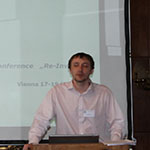Euroacademia Conferences
 Europe Inside-Out: Europe and Europeanness Exposed to Plural Observers (9th Edition) April 24 - 25, 2020
Europe Inside-Out: Europe and Europeanness Exposed to Plural Observers (9th Edition) April 24 - 25, 2020 Identities and Identifications: Politicized Uses of Collective Identities (9th Edition) June 12 - 13, 2020
Identities and Identifications: Politicized Uses of Collective Identities (9th Edition) June 12 - 13, 2020 8th Forum of Critical Studies: Asking Big Questions Again January 24 - 25, 2020
8th Forum of Critical Studies: Asking Big Questions Again January 24 - 25, 2020 Re-Inventing Eastern Europe (7th Edition) December 13 - 14, 2019
Re-Inventing Eastern Europe (7th Edition) December 13 - 14, 2019 The European Union and the Politicization of Europe (8th Edition) October 25 - 26, 2019
The European Union and the Politicization of Europe (8th Edition) October 25 - 26, 2019 Identities and Identifications: Politicized Uses of Collective Identities (8th Edition) June 28 - 29, 2019
Identities and Identifications: Politicized Uses of Collective Identities (8th Edition) June 28 - 29, 2019 The European Union and the Politicization of Europe (7th Edition) January 25 - 26, 2019
The European Union and the Politicization of Europe (7th Edition) January 25 - 26, 2019 7th Forum of Critical Studies: Asking Big Questions Again November 23 - 24, 2018
7th Forum of Critical Studies: Asking Big Questions Again November 23 - 24, 2018 Europe Inside-Out: Europe and Europeanness Exposed to Plural Observers (8th Edition) September 28 - 30, 2018
Europe Inside-Out: Europe and Europeanness Exposed to Plural Observers (8th Edition) September 28 - 30, 2018 Identities and Identifications: Politicized Uses of Collective Identities (7th Edition) June 14 - 15, 2018
Identities and Identifications: Politicized Uses of Collective Identities (7th Edition) June 14 - 15, 2018
Czech Modernity As Secular Modernity
-
-

-
Presentation speakers
- Roman Vido, Masaryk University, Brno, Czech Republic
- Download presentation
Abstract:
When social scientists speak about religion in modern Europe, they tend to view its Western (or North-Western) part as more secular/secularized than its (Central) Eastern part. Especially in the post-1989 era, Central and Eastern Europe have often been dealt within the context of religious revival after almost half of the century of Communist rule with its overt atheist and antireligious policy. However, in the same manner as some scholars warn against too homogenizing and/or generalizing tendencies in the sociological study of religion in Western Europe, we need to be prepared for recognizing different patterns in Central/Eastern European region too. The case of the Czech Republic might be an instructive one in this respect. As quantitative empirical data from international comparative surveys repeatedly show, Czech Republic is among the most secular societies in Europe. Its religious profile is very similar to those of France, the Netherlands or Scandinavian countries. What does this fact sociologically mean? What social factors lie behind it? Is it sufficient to look for a proper explanation in classical modernization theories? Or shall we rather take into account some specific historical and cultural circumstances? And is there something like “Czech modernity” as a special (sub)type of modernity in the sense of Eisenstadt’s “multiple modernities”? In my paper, I would like to suggest how the conceptual framework of multiple secularities inspired by Shmuel Eisenstadt and elaborated by a German sociologist Monika Wohlrab-Sahr can help us in our efforts to understand the Czech case.
-
Related Presentations

Dark Age of Economics of Transition: The Case of Bosnia & Herzegovina’s Economic Transition
- Dragoljub Stojanov
















